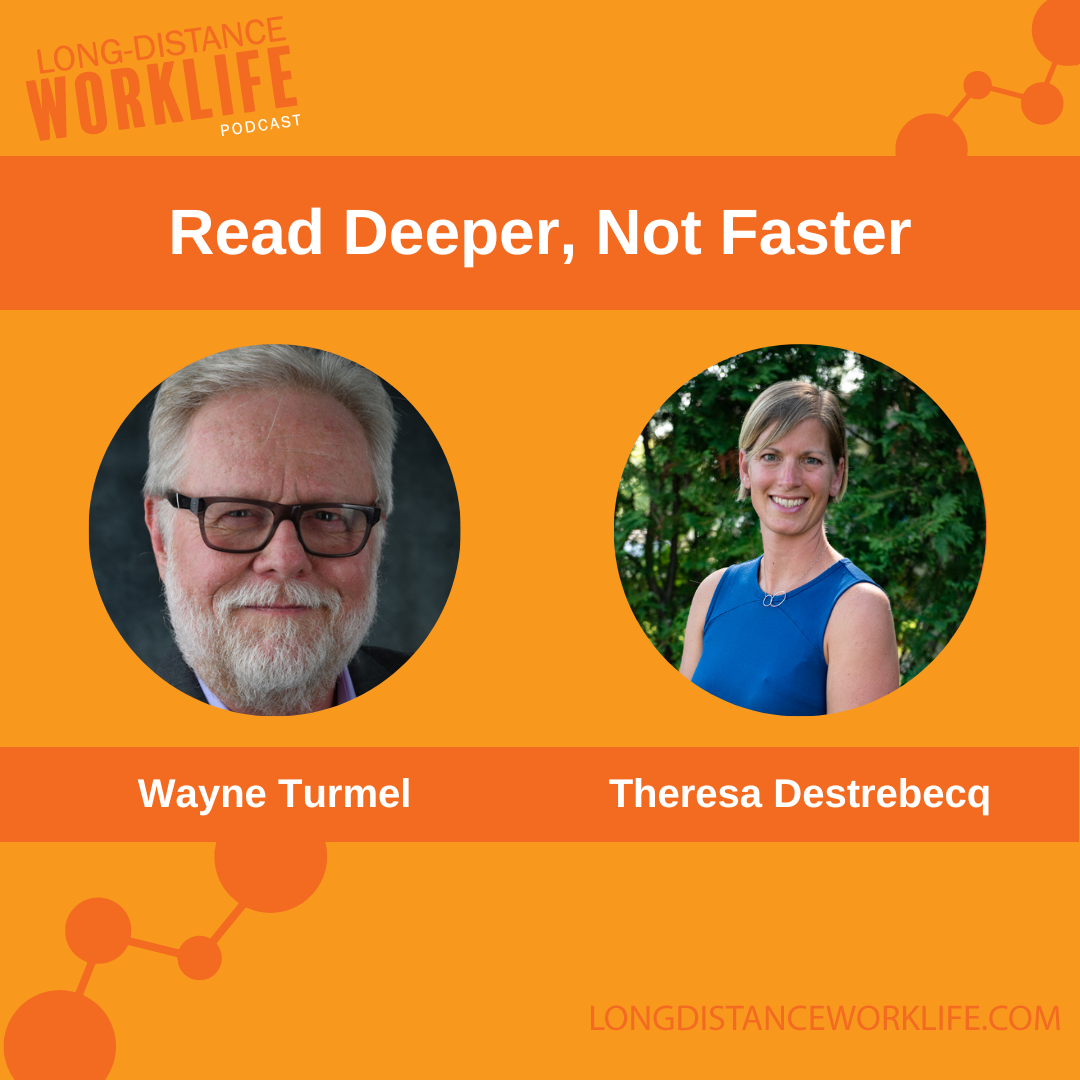Wayne Turmel speaks with Janice Chaka, CEO of the Career Introvert. They debunk common myths about introverts thriving in remote work, discuss the challenges and opportunities introverts face, and emphasize the importance of individual needs, open communication, and setting boundaries. Janice shares strategies for introverts to showcase their achievements, maintain visibility, and navigate hybrid work arrangements. Join them as they empower introverts to thrive in the remote work era and embrace their unique strengths.
Key Takeaways
1. Not all introverts thrive in remote work environments. Janice highlights the importance of considering individual circumstances, work environments, and support systems in determining success.
2. Effective communication and setting boundaries are crucial for remote workers, especially introverts. Regular check-ins with managers, discussing expectations, and finding preferred communication styles help maintain productivity and work-life balance.
3. Janice shares strategies for introverts to showcase their accomplishments in remote work settings. Keeping track of successes, collecting positive feedback, and utilizing data can help introverts build a strong case for recognition and advancement.
4. With the return to office spaces, it's essential to clarify the definition of hybrid work during job interviews. Understanding the requirements, flexibility, and potential changes in the future ensures alignment with personal preferences and work-life balance.
5. Emphasizing the importance of embracing introverts' unique strengths and needs. By understanding themselves and effectively communicating with their managers, introverts can navigate remote work successfully and thrive in their careers.
00:00:07:21 - 00:00:31:09
Wayne Turmel
Hi, everybody. Welcome back to another episode of the Long Distance WorkLife, the podcast designed to help us thrive, survive, live, just generally keep the weasels at bay as we adjust to the ever evolving work of remote work and hybrid work and figuring out who does what with which to whom where. I'm Wayne Turmel. I am your host today.
00:00:31:09 - 00:00:52:01
Wayne Turmel
Marisa is not with us. But do not despair. We have an excellent conversation with a colleague of mine, Janice Chaka, and we are going to bring her in right now to discuss introverts and remote work and all of that good stuff. Ms.. Janice. Hello.
00:00:52:02 - 00:00:54:16
Janice Chaka
Hi.
00:00:54:18 - 00:00:56:04
Janice Chaka
Thank you. For that great introduction.
00:00:56:07 - 00:01:06:17
Wayne Turmel
Just chair dancing away, which is what we love here on the show. Janice, very quickly. Who are you? What is the career introvert? And then we'll get into our conversation.
00:01:06:19 - 00:01:25:22
Janice Chaka
All right. So my name is Janice Chaka, and I am the CEO of the Career Introvert, which basically means I do a lot of things to help introverts be successful, whether it be courses one on one, coaching, leadership, coaching, keynote speaking, whatever it is, it's all designed to help introverts survive and thrive in the workplace or starting their own business.
00:01:25:22 - 00:01:55:23
Wayne Turmel
Excellent. So here's why I wanted to have this conversation. There's been a lot of chat, most of it silly about who thrives in remote work, who can be successful? Who can't. Who likes it? Who doesn't. And one of the things and it's not a myth in its entirety is this notion that introverts love remote work and extroverts want to be in the office partying it up.
00:01:56:01 - 00:02:17:10
Wayne Turmel
And I saw by the look on your face and for those of you listening to the audio, she has heard this nonsense more than enough. So let's start there. I mean, this notion of, you know, who likes to sit in the dark and work by themselves and who likes human companionship, The whole conversation has gotten a little out of hand.
00:02:17:12 - 00:02:43:22
Janice Chaka
Well, because it's based on a lot of assumptions. It's based on the assumptions that introverts who get to work from home are in that ideal environment all the time, that they're not sitting at the kitchen table with the kids screaming around them or not taking care of an elderly relative or whatever the absolute amazing environment would be. You know, not all of us have like three screens and ergonomic chair and a table that does fancy things.
00:02:44:00 - 00:03:08:18
Janice Chaka
A lot of the conversation is based on assumptions. And don't get me wrong. Of course, just like anything, there are some people who definitely enjoyed it. There was. There's good points and bad points to all, and it depends on the work that you do. It depends on the community. You have the support. You have the mentorship, you have the work environment, the culture of the organization.
00:03:08:20 - 00:03:22:10
Janice Chaka
There's so many things that come into play that you can't just blanket statement like, Oh, all the vets are super happy about the lockdown and we all have to work from home. And they were all very, very happy because, I mean, have you tried to work from home with an extra rep partner?
00:03:22:12 - 00:03:40:00
Wayne Turmel
Frighteningly enough, as excited as people think I am. I am one of those borderline extroverts who suck it up when I have to. And on a scale of 1 to 10, my bride is an 11 extrovert. So, yes, I feel your pain.
00:03:40:02 - 00:04:01:14
Janice Chaka
My partner has to have noise on all the time. If it's not TV, the radio, podcast, music, something. And I'm just I, I, I have headphones. Luckily, there's enough space that we can do this in separate rooms. But not everyone has that luxury. So, yes, there is lots of blanket statements. That is a lot of assumptions and no one's asking, no one's curious.
00:04:01:14 - 00:04:18:21
Janice Chaka
And people forget that we're all individuals. And sometimes it's really nice to be in the office, sometimes not be in the office, sometimes you need to do cognitive work, sometimes whiteboards work better than Zoom sometimes, and tech fails and we don't have the space that we would like that would be good for us with plants and a natural sunlight.
00:04:18:21 - 00:04:28:10
Janice Chaka
And there's just so much there and we just all forget that we're all human and individual and have individual needs and wants and desires that can make things good or bad.
00:04:28:12 - 00:05:00:18
Wayne Turmel
And so we've struggled through three years and we've managed to make it work, much to the absolute amazement of senior leaders. Largely, we didn't for a moment believe this was going to work. And now we are in this weird transition time where we're returning to office, kind of sort of. And there's a feeling that, you know, those are ungrateful workers are resisting returning to the office.
00:05:00:18 - 00:05:27:06
Wayne Turmel
I get the sense, and this is why I wanted to have this conversation with you. I get the sense that a lot of people are happy to go back to the quote unquote, good old days where everything that managed your career was about networking and being extroverted and drawing attention to yourself and all kinds of things. And that wasn't such a swell thing before.
00:05:27:06 - 00:05:39:01
Wayne Turmel
And I suspect it's probably not as well thing now. What are you seeing in terms of return to the office and who's looking forward to it and who's not?
00:05:39:06 - 00:06:06:10
Janice Chaka
Generally speaking, almost no one is looking forward to it. They look forward to it. If there is degrees of flexibility, not if you have to be in every Friday or three days a week or five days a week if it doesn't work for the life that they have now created. Because life didn't stand still for these past three years, people got used to certain things, try different things, got a taste of different things, and now want something else out of their work life.
00:06:06:12 - 00:06:32:06
Janice Chaka
And organizations like haven't clued into that or not being flexible enough for that. And as far as the having to be in the office and have that face time so your managers can see you and know exactly what you're doing. The world of productivity is a whole other side segment on that. But what I'm seeing is a lot of people just wanting to know, okay, I want to show up.
00:06:32:06 - 00:07:13:00
Janice Chaka
I want to spend time and do well at my work, but my bosses or my supervisors or whoever's in charge, expectations are still back in 2019 and it hasn't moved forward because as far as they're concerned, we need to go back to normal. And in their minds, normal is whatever used to happen in 2019. And so you find a lot of people struggling to communicate, and especially now with a lot of people are being laid off, communicate that worth because they feel that they have to do that, go back to the office or else I will be cut because it is now used as a retaliatory retaliation, retaliate, retaliation.
00:07:13:00 - 00:07:14:04
Wayne Turmel
Military is.
00:07:14:06 - 00:07:53:09
Janice Chaka
Retaliatory thing. And if you do well, you get to stay working from home. But if the boss doesn't like you, you have to come back into the office. It's used as a tool to bash people over the head that is really vindictive and petty. And it shows it highlights just how bad managers are, how much training managers haven't had to be leaders in a remote environment, and hybrid and hybrid is such a it's a spoken word, but how we can mean anything from coming in once a month, once a week, once a year, once it's so vague and so with people wanting to show up more, it's a case of you can still do the
00:07:53:09 - 00:08:15:01
Janice Chaka
same things that you used to do. I'm sure your manager doesn't know everything you used to do. So once a week, send him an email. Hey, here's my successes, here's my losses. And so your manager knows or whatever their preferred communication style is, you definitely have some people who are like, No, my boss likes email or a spreadsheet or numbers or like a pretty canvas or whatever it might be communicate.
00:08:15:04 - 00:08:32:09
Janice Chaka
If you don't know what your managers expectations are, you kind of have to ask them to fit in with that. And as far as the networking part of it is concerned, I know some people who thrived over the last three years that working remotely and I kind of have this collaboration, I'm doing this, I'm doing this other thing, and we're human.
00:08:32:09 - 00:09:01:14
Janice Chaka
We all do like that in-person interaction. But what I've seen also is a lot of organizations being like, well, coming back in, we're going to do an Employee Appreciation Day, which is wonderful. And then they shove every last thing that could possibly find into this two days to the point that I spoke at one event where they didn't really get lunch because someone was speaking at them while they ate lunch during their Employee Appreciation Day and there was no bathroom breaks.
00:09:01:16 - 00:09:27:07
Wayne Turmel
Okay. So aside from places that violate the Geneva Convention, what you said sounds truly awful. I want to go back to something that you said, which I think is really important. Kevin and I have talked on many occasions in the long distance books about ethical visibility. This notion of you have to be visible to your manager and to your teammates, right?
00:09:27:10 - 00:10:15:17
Wayne Turmel
People have to know what you're doing and it allows you to get the reward and recognition that you need. And you said something that is a blinding flash of the obvious, but also people don't always heed, which is this notion of how does your mic, how will your manager know how you're doing right? Because they have to do performance reviews and they have to do stuff right as managers, How what are you finding works successfully if you are not fond of tooting your own horn and you're, you know, and you're you want to be from home more often than not, what kinds of things are managers worried about and what are you seeing people do
00:10:15:23 - 00:10:22:18
Wayne Turmel
that allows them to successful early make their case and stay on the radar?
00:10:22:20 - 00:10:52:05
Janice Chaka
Data Data is key. Any time a client, a coworker, a insert here says something nice about you or the work that you've done or how you've helped them pass that along. Also keep a copy of it. So when it comes to your annual review, you have it once a week. Do review. What have your successes been? But really bad because we're so stuck in the weeds of just getting things done and it is hard to celebrate your wins.
00:10:52:07 - 00:11:10:10
Janice Chaka
Just go and look at your calendar, see how many meetings you had, what projects you finished, how or how, what progress you made in the projects. And write those down. Keep a little file, keep a notebook, keep a OneNote like Evernote, insert note here and you'll be amazed when you start going back and reviewing that like once a month.
00:11:10:10 - 00:11:33:12
Janice Chaka
Oh man, I did all of these things. I didn't realize that because we forget. Like I can tell you what I ate last Tuesday. Like, I don't know, but if you have that written down or voicemails, if that works better for you, you then have that data to go ahead and use that for promotion, to use that to say, look at all the stuff that I did and honestly for yourself is really important for you to acknowledge what you've done.
00:11:33:12 - 00:11:57:21
Janice Chaka
And sometimes it's really hard because you're just trying to get through each and every day. And so example, one thing I teach my clients is this You get to see video, we'll see this. I have a box. If you're British, you will know what this is not, but you're going to be very confused. And in this box, I'm supposed to once a week go through and be like things I've achieved and it doesn't have to be like I saved the world.
00:11:57:23 - 00:12:21:10
Janice Chaka
It can be. I managed to do eight back to back meetings without crying. Like whatever it is, that means success for you is very, very personal. Then go ahead and put that in the box and then New Year's Eve. Or when you're having a bad day. OpenTable and kind of look at it, look at all the things that you've got and it'll cheer you up.
00:12:21:12 - 00:12:22:16
Janice Chaka
Shocking.
00:12:22:18 - 00:12:47:19
Wayne Turmel
Yeah. And I mean, you know, keeping the sweets box full of stuff is is lovely. I simply have a folder in my outlook and when somebody says thank you so much or they send me a note, it just gets copied over there and I have it right. So when I have and of course we are very good here because Kevin is a terrific manager.
00:12:48:00 - 00:13:13:08
Wayne Turmel
We have regular conversations about performance, right? It's not like, okay, we talked about goals in January and now it's November and you have to dance for grandma and prove your value. This is an ongoing conversation in our world, which is also part of the thing, right? Is this ongoing conversation and keeping people in the loop instead of having to save everything up.
00:13:13:08 - 00:13:17:10
Wayne Turmel
And then, you know, justify your very existence.
00:13:17:12 - 00:13:38:02
Janice Chaka
Yes, very much so. And and that calls into play the company culture. Are they doing regular check ups or is it the annual review that everyone hates, building that relationship with your manager, putting time on the calendar and you could just be chat or like, what am I done? This? The old people talk about like roses and thorns.
00:13:38:02 - 00:13:55:00
Janice Chaka
Like, what am I to roses and what is my one thorn and what's holding me back? Or I need help with the more you communicate with your leader, the more they get to know you and your style and what works for you and what doesn't. And this is also for introverts, to be fair, how you can set your boundaries.
00:13:55:02 - 00:14:12:04
Janice Chaka
But I haven't been able to work on this project because I've just been in useless meetings. Maybe don't sell useless meetings for the past three days. Can I get a two hour block of time where I can put do not disturb and not be like not have blowback for helping you set boundaries and then your productivity will get better.
00:14:12:04 - 00:14:35:05
Janice Chaka
Your work will get better. They'll understand how you work and why you work that way. Yeah, there's so many little things that can be done outside of the company culture itself, but at the end of the day, knowing what your manager is looking for and what their manager is looking for is really important. So you can hit those targets, whatever it is that your boss has to do and show and prove that they're worth you to help them get there.
00:14:35:10 - 00:14:39:06
Janice Chaka
And if they don't communicate that to you, you have to, you know, poke the burn.
00:14:39:08 - 00:15:02:16
Wayne Turmel
A couple of things, too. What you just said. One is and I cannot stress this enough, and I hope that you would agree with me the single most powerful thing you can do to save your sanity is when you get that eighth meeting invitation is just start asking, do I really need to be there? And I'm serious as a heart attack.
00:15:02:16 - 00:15:26:11
Wayne Turmel
This isn't a whiny, you know, I didn't want to go to the meeting kind of thing. This is you have task me with doing X amount of work. How does this meeting fit into the priorities? It's a very simple question and it takes a certain amount of chutzpah, courage, whatever virtue, know whatever name you want to apply to it.
00:15:26:13 - 00:16:01:16
Wayne Turmel
But it's incredibly powerful and saves your sanity. More often than not. The second thing kind of ties to the last question that I want to ask you, which is, you know, this return to office means that some people are deciding to change jobs and people are being hired into hybrid work situations. And it's really critical that if you don't want to be horribly disappointed that you get definition on what does hybrid mean and what how do you have that negotiate?
00:16:01:22 - 00:16:10:04
Wayne Turmel
What does that look like when you are in the application? You know, you've gotten to the interview stage for the job.
00:16:10:05 - 00:16:15:12
Janice Chaka
Honestly, it should be before that should be in the job description. But that wasn't the question you asked me. So.
00:16:15:14 - 00:16:21:10
Wayne Turmel
Yeah, well, you know, in a perfect world.
00:16:21:12 - 00:16:42:22
Janice Chaka
So it's a case of, okay, if it's a new role that has been created and no one's ever had it before. But the question is how do you see it hybrid working for this in this role? What is the hybrid requirement for this role? What has the hybrid requirement been in the past or what would would it look like in the future?
00:16:43:00 - 00:17:02:22
Janice Chaka
Maybe what the hybrid requirement is for the department and and also question why? Because definitely some organizations that are just like, I have to be here two days a week. Why? Because, like, if there's a good reason, it's real because we have a team meeting, then we do this cognitive thing where we do board whatever. It's a specifically cannot be done online.
00:17:03:00 - 00:17:25:00
Janice Chaka
Great. If they just like because, hey, grab something that you are okay with and also ask, has this changed recently? And do you think this will change in the future? Because I've definitely had a lot of people who have signed up for a hybrid role been told it's one day a week, and then as soon as they're in the door and signed that contract, all of a sudden it's like, well, actually such and such is going on maternity leave.
00:17:25:00 - 00:17:50:11
Janice Chaka
So you need to be like three days a week. And that's not what they signed up for. That's not what they wanted. But they've got a job, so they like sitting up and shutting up so very much ask and ask what happens if it changes? How much advance notice would happen? A lot of organizations don't have these things in place because they are muddying through, but it should give the child something to think about and that you're serious about what it is you want from a role.
00:17:50:13 - 00:18:24:11
Wayne Turmel
I love the lovely British British term muddying up because basically we are all making this up as we go, which is an amazingly terrific opportune time to create your own path since the current path. It's all over at the moment. Janice, it's always so good to talk to you. I am delighted to have you with us. I am going to remove you from the room while I say our goodbyes.
00:18:24:16 - 00:18:48:06
Wayne Turmel
Yes, I know if you are and you should be interested in learning more about Janice and what she does, we will have links to her LinkedIn and the career introvert and other things in our show notes which are found at longdistanceworklife.com. If you've enjoyed the show, you listen to podcasts or you wouldn't be here.
00:18:48:06 - 00:19:19:18
Wayne Turmel
You know the drill. Please like subscribe tell your friends. Marisa has done yeoman's service in just barely a year. We have passed our 5,000th download, which is ridiculous, but thank you all for that. We are starting a series of regular segments on the show, including pet peeves and questions that you have about remote working. So we urge you to send those in to us.
00:19:19:22 - 00:19:45:01
Wayne Turmel
You can find either Marisa or I on LinkedIn or you can email us at Kevin Eikenberry Group and we are delighted if you are interested in team culture and figuring out how to structure your team. Our new book, The Long-Distance Team: Designing your Team for everyone's Success is out in the world. Thank you so much for joining us again.
00:19:45:01 - 00:19:53:16
Wayne Turmel
For heaven's sake, check out past episodes on longdistanceworklife.com. My name is Wayne Turmel. Don't let the weasels get you down.
Time Stamps
00:00 Introduction
01:25 Janice Chaka's bio and her work in helping introverts in remote work
02:17 Debunking the myth that all introverts love remote work and highlighting the importance of individual circumstances.
05:00 The resistance towards returning to the office and the misconception that everyone is eager to go back.
07:13 Challenges in communicating worth and dealing with vindictive office culture.
10:15 Strategies for introverts to showcase their achievements and maintain visibility.
13:13 The power of ongoing communication and check-ins with managers to set boundaries and foster productivity.
16:01 Clarifying hybrid work arrangements during job interviews and understanding the requirements and potential changes.
18:24 Closing
Related Episodes
Featured Guest

Name: Janice Chaka
What She Does: CEO of Career Introvert
Bio: Janice Chaka is a respected international leadership and organizational coach, business owner, podcaster, and introvert and impostor syndrome expert. Long before "working remote" was hip, she worked at fortune 10 companies leading remote recruiting teams. Known as The Career Introvert, Janice excels at solving complex HR challenges, creating learning content for organizations, and setting boundaries as an introvert -- Janice has discovered the strategies to make her introverted strengths turn into a successful company. Janice's experience of operating as an executive coach and as a consultant has made her a seasoned business partner for companies.
Additional Resources
- Learn more about Janice Chaka
- The Career Introvert
- The Traveling Introvert Podcast
- Learn more about Wayne Turmel
- Connect with Wayne Turmel on LinkedIn
- Email Wayne Turmel
- Purchase a copy of The Long-Distance Leader
- Purchase a copy of The Long-Distance Teammate
- Purchase a copy of The Long-Distance Team
- The Kevin Eikenberry Group
Order The Long-Distance Team
Remote leadership experts, Kevin Eikenberry and Wayne Turmel, help leaders navigate the new world of remote and hybrid teams to design the culture they desire for their teams and organizations in their new book!




